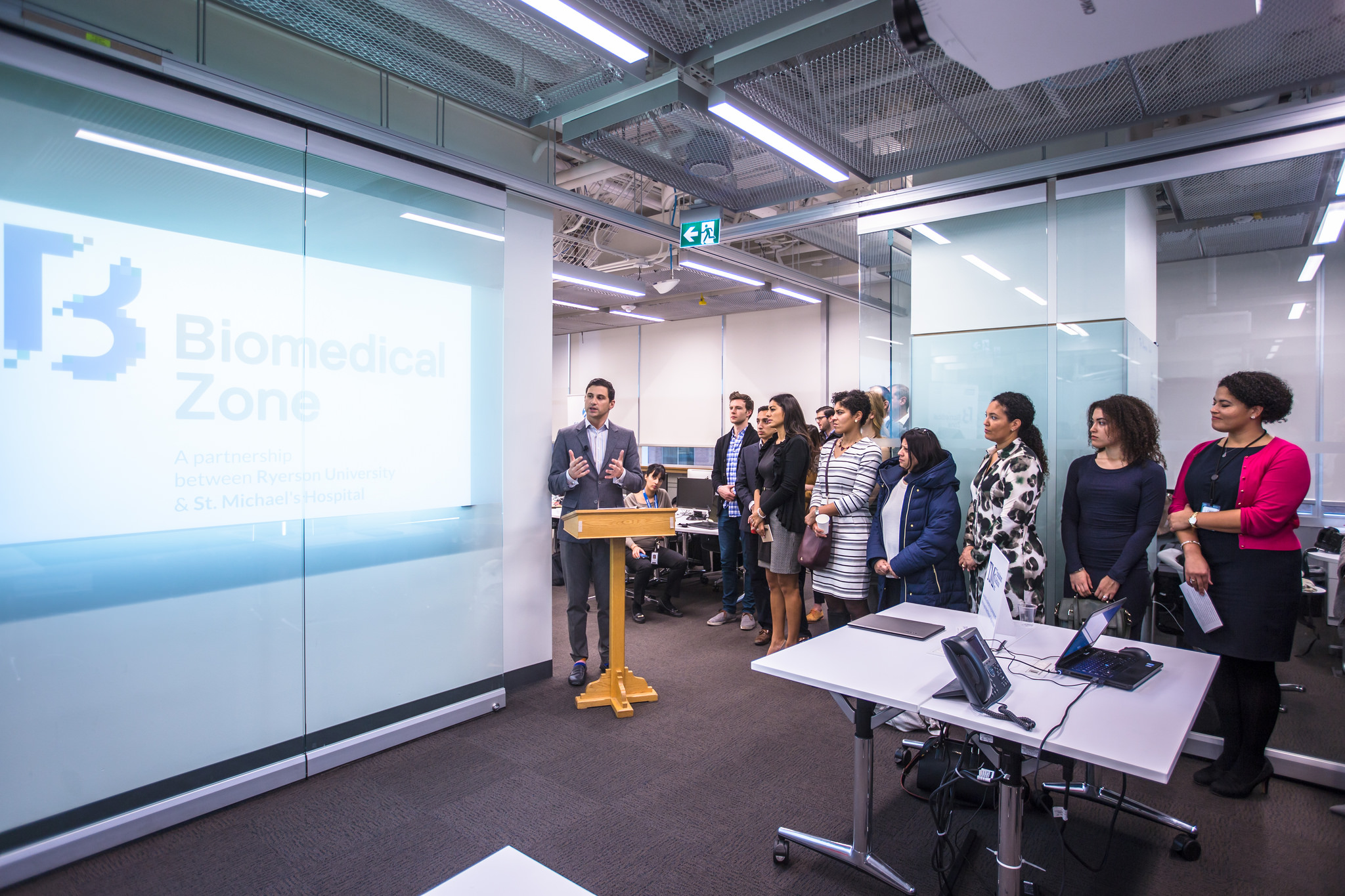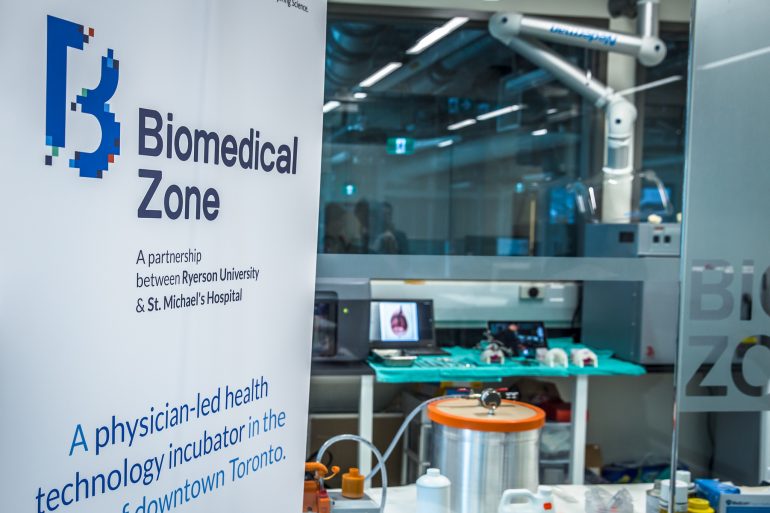On the 7th floor of Toronto’s St. Michael‘s Hospital is a small space with big, innovative ideas. It’s the office of the Biomedical Zone(BMZ), a startup incubator led by physicians in a clinical environment. There, startups work with clinicians one-on-one to develop tech within the settings in which they will be used.
In 2013, Ryerson University and St. Michael’s Hospital signed a 20-year agreement to work together. The first incarnation of the agreement was a research partnership, now called the Institute of Biomedical, Engineering, Science and Technology (iBEST). The idea of a healthcare and biomedical incubator was born out of the convergence of iBEST and the successful DMZ incubator model — which recently celebrated its first-year anniversary as the BMZ.
“In terms of our holistic vision of building something that medically helps people, we never could’ve gotten there without the clinicians.”
Dr. Linda Maxwell, director of the BMZ, said that before, Ryerson did not have the deep clinical engagement that you would find at other universities that have a medical school or a residency program. “This was a big deal; to be able to create an incubator that really encompassed the values of experiential learning, and integrating learning that we have at Ryerson with this huge asset: the clinical space, the clinicians, the patients, clinical workflows, how things happen in healthcare, and combine them into one,” said Dr. Maxwell.
Located in the Li Ka Shing institute, the BMZ places startups together with clinicians in the same space. The BMZ tends to focus on technology involving software, digital tech, and devices in medtech, rather than therapeutics, drugs, and pharmaceuticals.
Dr. Maxwell said that there’s a real hunger for this kind of a collaborative environment in the clinical setting — not just for the startups, but for clinicians as well. Dr. Maxwell says clinicians are eager to engage with technology, and also have a forum to speak about everyday challenges in their clinics that they feel would benefit from innovation.
This is good news for healthtech startups who are looking for experts to help them solve real problems. But to Dr. Maxwell, companies that are looking to join the BMZ must have a solid understanding of the specific problem that they can fix. “That’s the issue in medicine and healthcare. A lot of times, people create technology that doesn’t actually solve a burning issue. And because budgets are so tight and there’s so much demand, much of the tech doesn’t get adopted because the fit is not perfect enough,” said Dr. Maxwell.

Some startups understand the problem very well, but reaching the solution can still be tricky. Simulare Medical is a company that developed a cleft palate simulator, a physical model that allows surgeons to practice repairing cleft palates before operating on infants. The Simulare Medical team joined BMZ in September 2015 and launched their product in October 2016. They’ve made international sales, thanks to Dr. Maxwell connecting them to organizations they hadn’t considered before.
When they first started, they wanted to commercialize their product and sell it to surgeons. Then Dr. Maxwell connected them with Ryerson’s SocialVentures zone, and to government agencies that play a role in global health. Dr. Dale Podolsky, founder of Simulare Medical, said that their vision is to develop high-fidelity surgical simulators for other procedures as well.
“What surprised us is how much room there is for innovation in things that are so simple and have been done for decades that have never been improved,” said Dr. Podolsky. “And maybe it’s because there hasn’t been an avenue for physicians to pursue because they’re too busy.”
“You can’t make any decisions either at the zone level or company level, without thinking about how this is going to actually impact patients.”
Dr. Maxwell agrees that healthcare is in need of creative problem-solving. “It’s one of those industries that is so entrenched in the way it does things, it’s actually extremely ripe for disruption, but it’s very difficult to do because healthcare is so averse to risk,” said Dr. Maxwell. This is with good reason, as lives are at stake. To Dr. Maxwell, it’s about finding the balance between innovation with responsibilities and issues that arise in healthcare.
HelpWear is another company whose method of solving its initial problem changed thanks to the BMZ. This company develops the HeartWatch, a 24/7 non-invasive wearable heart monitor that can detect when a patient has a heart attack and can alert emergency services.
The last time BetaKit reported on HelpWear, they won $25,000 at the CNE’S Emerging Innovators Pitch Competition in August. Now, they are getting ready to go into clinical trials. But the founders’ journey during their time at the BMZ has been full of lessons, most of them taught by the clinicians.

Originally, their plan was to sell the product to cardiologists and provide them with more data. However, after talking to clinicians, they found that cardiologists can already obtain high-quality data on their patients.
But there’s another setting which could use HeartWatch’s tech: the emergency room. When someone is brought in, doctors have very limited data from that event occurrence. The data would just be from the person who brought them in or the patient themselves, and without any quantified data, it’s very difficult to make diagnoses.
Andre Bertram, co-founder of HelpWear, said that if they didn’t have the BMZ and clinical engagement early on, they wouldn’t have made it this far. “We’d be building something very similar to an Apple Watch or a FitBit,” said Bertram. And that’s not to say that those consumer products don’t add a lot of value. “But in terms of our holistic vision of building something that medically helps people, we never could’ve gotten there without the clinicians.”
Dr. Maxwell said that the BMZ is working with St. Michael’s on a data science initiative and data-generated clinical insights that is in its early days. To find that balance between innovation and healthcare, the BMZ’s environment is really the key to its success. “You can’t make any decisions either at the zone level or company level, without thinking about how this is going to actually impact patients. Because we’re sitting in the middle of (the hospital),” said Dr. Maxwell.


